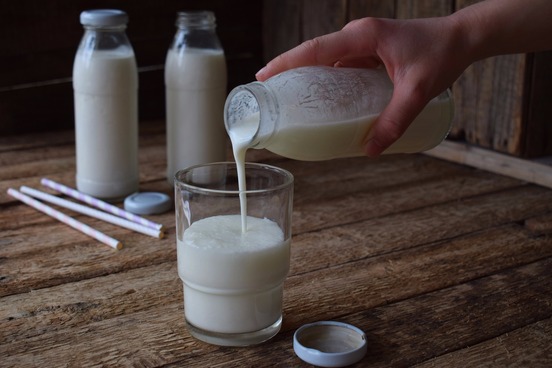
Racy
In the 16th century, race not only referred to a group of people, animals, or plants having a common ancestry but to a particular class of wine with a characteristic flavor supposedly influenced by the soil in which the grapes used in making it grew.
The golden Mountaine … which beares a wine of a more delicate and rich race than the Canaries, and inestimable plenty too.
— Giovanni Botero, Relations of the Most Famous Kingdomes and Common-wealths, 1630A pipe Of rich Canarie … Is it of the right race?
— Philip Massinger, A New Way to Pay Old Debts, 1633
In the 17th century, the adjective racy was uncorked to describe such a wine having a taste indicative of the origin and natural characteristics of its grapes.
Some curious Pallates have called it Vin Greco, rich and racy Canary, not knowing what name to give it, for its excellency.
— Richard Child, letter, 1651
In time, racy came to describe other juices having a pure, natural flavor. For instance, an apple might be said to be "rich with racy juice."
From the notion that the soil gives the grapes used in racy wines their distinctive qualities, racy began being used to describe people or things characteristic of their birthplace or place of origin.
Scots were they both by temper as by birth, And both were racy of their native earth.
— Hartley Coleridge, "Young and His Contemporaries," circa 1849
This sense of the word was often used in the expression "racy of the soil." In the 1840s, the expression was popularized in Ireland when the Irish nationalist newspaper The Nation adopted it as a motto to indicate its distinct Irishness. Racy of the soil has not yet been tucked away in the annals of history; it is still occasionally evoked, particularly by the Irish.
On the other hand most 19th- and early-20th-century naturalists and conservationists in Ireland came predominantly from among the Anglo-Irish, and were not exactly racy of the soil. And most of our current habitats and wildlife regulation originated in Brussels.
— Paddy Woodworth, The Irish Times, 30 Apr. 2016Wyssn is short, of course, for Whatever You Say Say Nothing. It is native to the Gael and racy of the soil.
— Fintan O'Toole, The Irish Times, 24 June 2017
Racy also came to specify things having a characteristic vigor, liveliness, or piquancy, such as a piece of writing, a speech, or a performance. That sense evolved in the late 19th century into the familiar use of the word for things risqué or suggestive.
Women who tell racy stories … can rouse a great deal of enthusiasm in a room full of men.
— "P. Bee," Vagaries of Men, 1901

Foxy
Does your beer taste foxy? Foxy has been used to describe beer turned sour during fermentation since the 19th century.
To avoid producing 'foxy' beer, with a tainted taste caused by acidity, the cautious brewer adopted the practice of rubbing a small proportion of the hops to be used with a small amount of salt, and tying them in a bag to soak ... whilst drawing off the wort from the mash tun.
— Pamela Sambrook, Country House Brewing in England, 1500-1900, 1996
Wine too can taste foxy, meaning it tastes briskly pungent. It is unclear if the two "flavor" senses of foxy are related, but the origin of foxiness in wine stems from the fox grape, a sour grape native to eastern North America that presumably is named for its characteristic musky odor with which people have compared to a fox’s.
The Foxe Grape … is white, but smelleth and tasteth like unto a Foxe.
— John Parkinson, Theater of Plants, 1640A second Kind … grow upon small Vines and in small Bunches; but are … of a rank Taste when ripe, resembling the smell of a Fox, from whence they are called Fox-Grapes.
— R. Beverly, Virginia, 1705
A popular kind of cultivated fox grape is the Concord, which is used to make wine, juice, jelly, and other foodstuffs.
British lexicographer John Stephen Farmer in his dictionary Americanisms proposed another etymology of the grape's name: rather than arising "from its rank, fox-like taste, … it is more probable that its distinctive name is derived from the old English 'fox,' to intoxicate." Farmer's suggestion is based on the fact that the juice from the grape can be very intoxicating when fermented. The verb he mentions is recorded in the early 17th century—the earliest record of fox grape is about mid-century—and it may have developed from the notion of the fox possessing a befuddling craftiness.
The last of whom I did almost fox with Marget ale.
— Samuel Pepys, Diary, 1660
Whatever its etymology, foxy describes wine made from the fox grape, and today the descriptor is used generally for the earthy muskiness or sharply brisk, fruity flavor of a wine—especially one that is made from American grapes.
… the huge bunches of grapes—Concords and Delawares—that Planchon saw being offered for sale by Italians at street corners for just fifteen cents. The locals seemed to enjoy them, although the visitor thought their taste "foxy."
— Christy Campbell, The Botanist and the Vinter, 2006Lukacs, the wine columnist for the Washington Times, tells how early wine pioneers had problems producing a quality vintage, as American grape varieties produced wine that was too "foxy" and imported ones scarcely produced any wine at all before falling victim to native diseases.
— Denis Donoghue, Publishers Weekly, 16 Oct. 2000The aroma of wine made from Concord and other labrusca grapes is often described as "foxy," a wine term as derogatory as it is vague. "Foxiness" isn't as unpleasant as most wine snobs like to suggest—one wonders how strange the great European wines would taste to palates honed on centuries of refined native American viticulture, if such a thing existed.
— Danny May et al., Berkshire Home Style, March 2007
The more familiar sense of foxy referring to attractiveness or sexiness originated in late 19th-century American college slang, and it may have developed from the crafty nature attributed to the fox. Early slang use refers to amorous play.
Glad to know you are feeling so foxy. Shall endeavor to keep you busy at the game.
— J. M. Carroll, Camp Talk, 1877

Tart
Considering that some fruit-filled tarts can have a tart taste, you might think that the two tarts are related; however, only one has a flavorful beginning. Tart referring to the small pie is from Anglo-French tarte, a word for a flat, open-topped pastry, and it became an item on the English menu about 1400.
The adjective tart, meaning "agreeably sharp or acid to the taste," is believed to be from teart, an Old English word describing something sharply painful or severe, such as punishment or discipline. Evidence of teart used in this sense in Middle English is virtually nonexistent, but it does inexplicably reemerge in the form tart in the 16th century before fading into obsolescence by mid-17th century.
Another way the news is not so tart.
—William Shakespeare, King Lear, 1606
Around 1400, about the same time the noun tart appears in English, the sharpness implied by the adjective was extended to sour taste and flavor. Later, the adjective begins to develop senses more in line with its original meaning: it is employed to describe the painful sharpness of a weapon's edge or point and the cutting sharpness of words.
Where wilt thou begin With thy tart phrase, to stinge and nettle him?
— Richard Brathwait, A Strappado for the Diuell, 1615Sometimes a tart Irony goes for Wit.
— John Hartcliffe, A Treatise of Moral and Intellectual Virtues, 1691
The histories of these two homographs might leave you wondering about tart as the name for an immoral woman. That use is believed to be related to jam-tart, a 19th-century British word that was cooked up as rhyming slang for sweetheart. Jam-tart was shortened to tart, which was used as a term of endearment and eventually disparagement.

Tangy
Tangy is used to describe a sharp, distinctive flavor that tends to linger on the tongue.
Southerners generally use salt on watermelon, he explained, "to spruce up the taste and make it tangy."
— Lydel Sims, Assignment: Memphis, 1982... mango has a tangy sweetness that perfectly balances the heat of the chili powder.
— Roberto Martin, Vegetarian Times, April/May 2015
The root of the word traces back to Old Norse tange, which was used for things having a sharp projecting point, such as land jutting out into a body of water or the extension of a blade attached to a handle. For the most part, the sense development of English tang reflects its Scandinavian source, referring to such things as the prong of a fork or the tongue of a buckle or knife. However, the earliest use of the English word is pointedly unique: it refers to a serpent's tongue, which was once believed to be a stinging organ. The word was later used for the sting of an insect, such as a bee.
Association of the word to stinging and sharpness eventually lead to a sense for a penetrating taste or flavor. That occurred in the 15th century.
At first, mee thought the tast was reasonable good, But ... it left (alas) a bitter tang behinde.
— Nicholas Breton, A Floorish upon Fancie, 1577
In the 17th century, another form of tang came about referring to a sharp, twanging sound, such as that produced when metal is struck or a string is plucked. The origin of the word is probably imitative, but it could have been influenced by the unpleasant piercing denoted by the earlier tang.
In The Tempest, Shakespeare may have engaged in wordplay with the homographs when he penned in the second act:
But none of us car'd for Kate; For she had a tongue with a tang, Would cry to a sailor "Go hang!"
— William Shakespeare, Tempest, circa 1611
Did Shakespeare intend tang to refer to a stinger, or the tang of a knife, in order to suggest that Kate had a sharp tongue? "Go hang" is certainly a stinging remark, but was it also said with a twang?
Although lexicographers Noah Webster and Samuel Johnson used the Bard's line to illustrate tang in the sense of "something that leaves a sting or pain behind," The Century Dictionary and Cyclopedia included it at the entry for tang meaning "twang." A case can be made for either interpretation, and perhaps that's what Shakespeare intended.

Well-hung
Meat that is well-hung has hung long enough to acquire the proper flavor. Dating to the mid-1700s, this sense of well-hung is the most recent.
When cold Winter comes have most Relief, From well hung Bacon, or good powder'd Beef.
— W. Bewick, Miscellaneous Poems, 1741The on-site food hall sees shelves stocked to the rafters with just-caught fish, fresh fruit and veg as well as well-hung meat alongside taste bud-tempting coffee and cakes.
— Chris Page, Thorne and District Gazette, 21 Aug. 2015Anna Hansen, the chef at Clerkenwell's Modern Pantry, cites well-hung meat as her muse, specifically pork. She said: "For me a good piece of meat is something of beauty and a flavour that just can't be beaten."
— Amy Lewis, MailOnline, 19 Mar. 2015
The term is probably older than what written evidence indicates—surely, there have been many well-hung pictures throughout history—but the earliest documented use of it goes back to the early 1600s and refers to a hound having large droopy ears. That use became obsolete by the end of the 18th century.
Another specific use of well-hung from the 1600s is in reference to the tongue. A well-hung tongue is thought to be hung skillfully and able to work readily and freely. A person endowed with such a tongue is therefore glib or fluent in speech.
All the dupes of the charlatan's well-hung tongue are familiar figures of farce.
— The Times, 26 Aug. 1950
Today, this sense is rarely if ever used in everyday speech and writing, but it can still be encountered in literary works describing characters given to tongue-wagging.
Another sense of well-hung also joined the English language in the early half of the 17th century. Many readers are probably familiar with it, but we would rather not mention the member by name. We'll just say that the sense is punningly alluded to in the following excerpt from the 1762 novel The Life and Opinions of Tristram Shandy, Gentleman by British writer Laurence Sterne.
I was five years old.—Susannah did not consider that nothing was well hung in our family,—so slap came the sash down like lightening upon us; — Nothing is left, — cried Susannah,— … for me, but to run [flee] my country.

Blinky
In English dialect, if your milk is blinky or your milk is going blink, it is slightly sour.
Blink milk, "milk somewhat soured." West Virginia.
— C. F. Smith, "Southernisms," 1883Had some blinky milk in the house. It was on the turn, would 'a been clabber by tomorrow.
— Ron Arnold, The Grand Prairie Years: A Biography of W. C. Perry, 1986No proper place for cooling milk in summer meant not only blinky milk unfit to drink, but no sweet cream ....
— Harriette Simpson Arnow, Seedtime on the Cumberland, 1995
The adjectives blinky and blink are derived from a verb form of blink meaning "to turn slightly sour," whose origin has been sought in the belief that milk can be soured by the glance of an "evil eye." The following quotes from the 1898 English Dialect Dictionary suggest that witchcraft of some sort was sometimes to blame for the souring of milk.
Blink, to bewitch cattle and cause them to have little or no milk and butter. — 1892
Cow's milk is said to be blinked when it does not produce butter, in consequence of some supposed charm having been worked—a counter charm is required to bring it right. — 1890
And milk is not the only beverage capable of blinking.
The beer which we called blinked has no acidity, but an ill flavour peculiar to itself; said to be occasioned by too long delay in fermentation. Blinked-beer will have a great tendency to turn sour; but certainly in our usage is blinked before it is sour. — 1898

Brisk
Brisk was brewed in the second half of the 16th century. In form it is similar to older Celtic words, but its ancestry is uncertain. What is known is that William Shakespeare and his contemporaries were familiar with the word. The Bard himself used the word in various ways to suggest literal and figurative liveliness.
To see him shine so brisk, and smell so sweet …
— Henry IV, Part 1, 1598Be brisk awhile, and the longer liver take all.
— Romeo and Juliet, 1599A cup of wine that's brisk and fine …
— Henry IV, Part 2, 1600Of these most brisk and giddy-paced times.
— Twelfth Night, circa 1601
It is probable that brisk is a modification of the French borrowing brusque, meaning "abrupt," which appears earlier in Scottish English as bruisk. French brusque is itself a borrowing from Italian, where it was spelled brusco and meant "tart." The Italian term came from bruscus, the Medieval Latin name for the butcher's-broom, a shrub whose bristly leaf-like twigs have long been used for making brooms.
In the 1600s, both brusque and brisk were used to describe wines having a sharply tart taste. This use of brusque was shelved at the end of the 18th century, whereas brisk continued to ripen as an adjective for taste and flavor. In particular, it came to describe drinks having a stimulating taste, like beer, as well as ones being pleasingly pungent or tangy, like tea.
A bottle of beer ... is made brisker by being set before the fire.
— James Boswell, The Life of Samuel Johnson, 1791
In time, brisk was applied to other things fresh and invigorating, like a brisk breeze or brisk weather.

Mellow
And now, a palate cleanser.
The origin of mellow is hazy. The word could have ripened from a Middle English variant of meal, as in "ground grain," or it could be a variant of Old English merrow, which meant "tender" or "soft." In either case, its possible source denotes a soft quality, and the adjective was first used in the 15th century that way to describe fruit turned soft and sweet because of ripeness.
In the 17th century, mellow was being used for the smooth and mild flavors in food other than fruit as well as in beverages, especially those developed in maturation, as cheese or wine. In addition, the mature and mild qualities implied by the word were transferred to people. A mellow person could be either softened by age or experience or feeling mildly intoxicated from beer, wine, or spirits.
In the 1940s, being mellow could also mean a person was feeling pleasantly euphoric from the effects of a drug or perhaps—fast-forward two decades—from mellow yellow.
Mellow Yellow, 1960s hoax. Inside scrapings from banana skins that were baked, then smoked, allegedly producing effects akin to marihuana.
— Ernest L. Abel, A Dictionary of Drug Abuse Terms and Terminology, 1984

Robust
From a Latin word meaning "made or consisting of oak," robust is rooted in strength and hardiness like the tree itself. But before being used in the early 17th century as an adjective relating to the sturdy physical composition of a tree (as in "a robust oak"), the word was used in English to describe the strong physical build and vigorous health of a person or animal.
The 1600s marked the beginning of a robust sense development of the word as it began being applied to things promoting health and well-being, as in "robust exercise" or "a robust diet." By mid-century, loud and powerful "robust voices" were being heard and soon solidly made materials and structures, such as steel and furniture, were said to be "robust."
It wasn't until the late-19th century, however, that the strength associated with robust was applied to the taste or flavor of food and drink. In particular, the word came to refer to beverages imparting to the palate the general impression of weight and rich texture, such as wine or coffee, and to foods richly nutritious or flavorfully bold, like stew.
About the same time, economists picked up the term to describe a thriving or resilient market, economy, etc.
… the stock market soared to a new record … and the outlook for the job market remains robust.
— Roger Yu, USA Today, 27 Dec. 2017
The meaning of robust was further strengthened in the 1970s, when computer scientists adopted the term for programs able to recover from errors or capable of performing without failure under a wide range of conditions.
A robust system remains in service and performs correctly even in the face of problems such as hardware failures, illegal arguments to functions, and software exceptions.
— Greg Utas, Robust Communications Software, 2005





